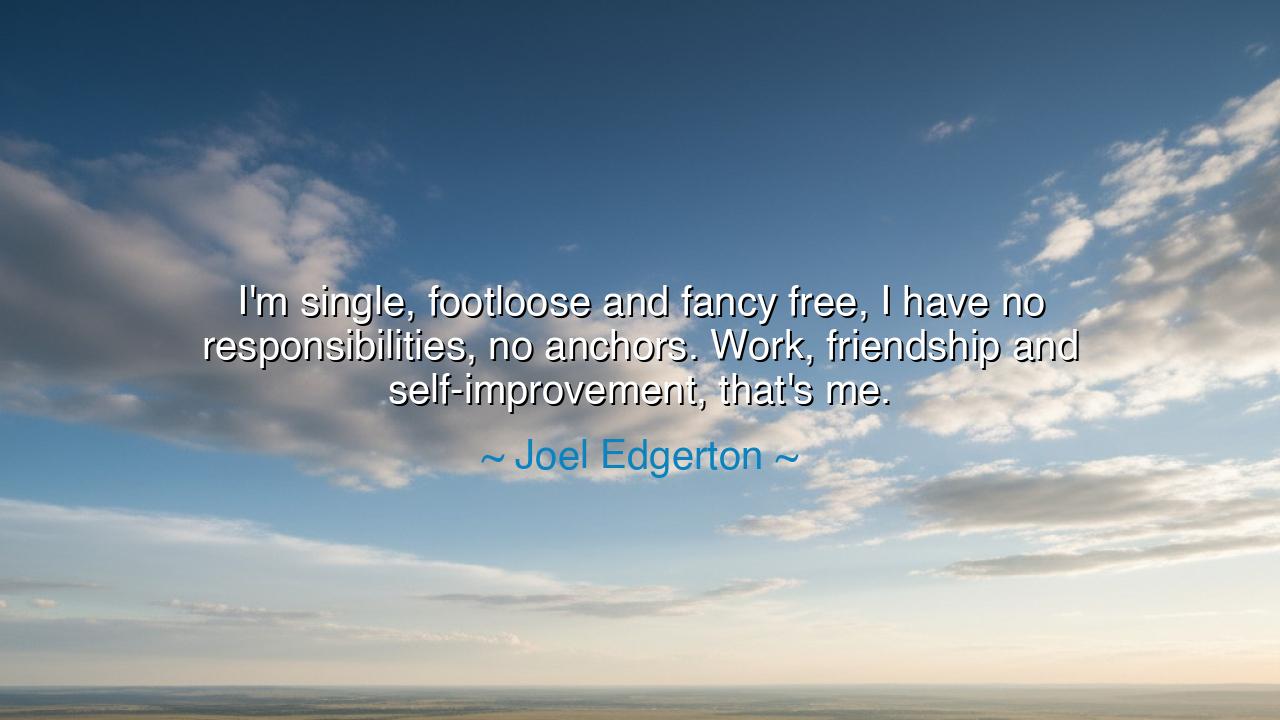
I'm single, footloose and fancy free, I have no responsibilities
I'm single, footloose and fancy free, I have no responsibilities, no anchors. Work, friendship and self-improvement, that's me.






Joel Edgerton speaks with a sense of freedom and self-determination when he declares, "I'm single, footloose and fancy free, I have no responsibilities, no anchors. Work, friendship and self-improvement, that's me." In these words, he encapsulates the exhilarating, yet sometimes misunderstood, state of being unattached. To be without responsibility, to be footloose and fancy free, is to possess the freedom to live without the constraints that often come with relationships or societal expectations. It is a life unburdened by the ties that bind others to commitments and duties, and yet, in that freedom, there is an inherent call to shape one’s own destiny, to focus on personal growth, and to invest deeply in the things that matter most: work, friendship, and self-improvement.
This notion of freedom without attachment is not foreign to the wisdom of the ancients. The Stoics, those ancient philosophers of Rome and Greece, often spoke of the value of independence and self-mastery. Epictetus, in his writings, urged that true freedom lies not in the ability to control the external world, but in the ability to control the self. Freedom in the Stoic sense is achieved through detachment from external concerns, freeing the individual from the tyranny of expectations and external validation. The single life, unmarred by responsibilities, offers the perfect opportunity to focus on personal development, as Edgerton suggests—working toward the cultivation of one’s character, intellect, and virtue.
In the stories of great warriors and adventurers, we find similar expressions of freedom and the deliberate choice to embrace a life of self-reliance and personal growth. Alexander the Great, though a conqueror of nations, often valued personal growth and wisdom. As he marched through the lands, he sought to learn from the peoples he encountered, often engaging in discussions with philosophers and scholars. He knew that his work, his friendships, and his understanding of the world were integral to his journey, and he focused on cultivating these aspects of himself. His adventures were not merely about conquering lands but about deepening his mind and spirit, seeking the kind of growth that would lead him to greatness not just as a ruler but as a thinker.
However, freedom does not always come without its challenges. The life of the ancient warrior, free from the chains of familial obligation, was often accompanied by a loneliness that many could not understand. Consider the samurai of Japan, who, while free to pursue mastery in martial arts and philosophy, often did so in solitude. Their focus on self-improvement and discipline meant they spent countless hours alone, honing their skills, meditating, and striving to become better versions of themselves. They lived lives of freedom, but this freedom came with sacrifices—solitude and sometimes isolation. This brings us to a deeper truth: freedom, while exhilarating, often requires a price, a price of being unmoored from the attachments and connections that offer stability and comfort.
In more recent times, we see the life of Henry David Thoreau, the American transcendentalist who famously spent two years living alone in a cabin by Walden Pond. Thoreau sought to live deliberately, free from the distractions and entanglements of society. His experiment in solitude was an attempt to strip away the unnecessary and focus entirely on the essence of life: the cultivation of the self. Like Edgerton, Thoreau embraced the idea of living without the anchors of conventional expectations—dedicating himself to work, self-reflection, and personal development. Yet, in Thoreau’s case, his isolation led him to a deeper connection with nature, and in turn, to a more profound understanding of his place in the world.
Edgerton’s words suggest that self-reliance and independence can be sources of empowerment, but they also remind us that without responsibilities, one may feel unanchored, drifting at times through life without a clear sense of direction. This paradox of freedom and isolation must be faced with wisdom. It is not the absence of relationships, duties, or commitments that leads to fulfillment, but the balance between freedom and responsibility—understanding that true growth comes from choosing what to commit to and dedicating oneself to that pursuit. The single life, free from anchors, offers an opportunity to focus on work and self-improvement, but it is the conscious choice to invest in meaningful relationships, passions, and goals that turns freedom into a life worth living.
Thus, the lesson is clear: freedom is a powerful gift, but it comes with a deeper responsibility to cultivate one’s own purpose and meaning. To live without external anchors is to give oneself the chance to focus on personal growth, but it also requires that we create our own anchors—whether through work, self-improvement, or friendship. This balance is essential for turning freedom into a life of true fulfillment. Embrace your freedom, but do not fear commitment. Seek the strength to navigate the world on your own terms, but remember that true freedom is not the absence of responsibility, but the ability to choose which responsibilities give your life meaning.






AAdministratorAdministrator
Welcome, honored guests. Please leave a comment, we will respond soon